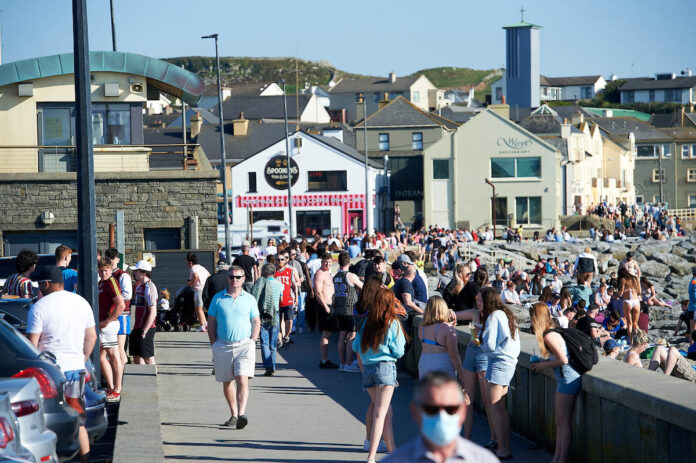DISCARDED cigarette butts, food-related waste and extensive dog fouling has been reported from Lahinch in a survey by Irish Business Against Litter (IBAL) of beaches and harbours.
The popular resort slipped to ‘moderately littered’ in the report, as did Doolin Pier and Harbour. On the plus side, Mountshannon was again found to be ‘Clean to European Norms’.
Overall, litter levels are on the rise, with only 8 of 33 areas surveyed receiving the ‘Clean’ designation. Alongside its impact on tourism and recreation, IBAL is warning that coastal litter has grave implications for the future of our planet.
The An Taisce report for Lahinch stated: “There was plenty of dog fouling signage, some attached to railings and rocks, some imprinted on the ground and an audio message – and yet dog fouling prevailed.
“Cigarette butts were also obvious, particularly around the drains. Other litter items included plastic bottles, fast-food wrappers and sweet papers; marine related items included fishing lines / nets / rope (found in the rock armour on the beach). The surrounds of the top car park were littered and there were no visible litter bins.”
The An Taisce report for Doolin stated: “There was a heavy cigarette butt presence in the car park with people seemingly throwing butts out of parked cars; food related items included plastic bottles, utensils and sweet wrappers. Some dog fouling and covid related litter was present.
“There weren’t any bins apart beside the food stand and no opportunities for the separating / recycling of litter. Both the yellow and green ‘Mutt Mitt’ facility were fresh and clean; signage relating to beach usage, parking, ‘Scoop the Poop’ and ‘Keep Dogs on Lead’ was in good order.”
The An Taisce report for Mountshannon stated: “A very freshly presented and well-maintained environment with evidence of community clean-up and a thorough cleaning regime. Very good dog fouling signage and facilities for the disposal of same – this appears to be having the desired effect – there was no evidence of same.
“The recycle facility was well presented and clear of any accumulations; recently erected signage discouraging the feeding of swans as they defecate in the swimming area, contaminating the water; cigarette butts were obvious but apart from that, there was a virtual absence of litter throughout the area surveyed.”
Beaches, harbours, rivers and their immediate environs were monitored by An Taisce in June and July. While Tramore was again clean, many popular beaches slipped to ‘moderately littered’ status, among them Lahinch, Brittas Bay, Curracloe, Portmarnock, Strandhill and Clogherhead. Bundoran was again ‘littered’. By contrast, Salthill improved significantly.
“Unfortunately the improvement observed at our beaches last year seems to have reversed this time round,” commented IBAL’s Conor Horgan.
“We had hoped that the decline in Covid-related litter might bring an improvement in overall cleanliness, added to the fact that many who staycationed last year would have travelled abroad this summer. Our most popular beaches are not heavily littered, but they’re not as clean as they should be.”
Unsurprisingly there was a fall-off in Covid masks and gloves found, but also in alcohol-related litter which was linked to lockdown.
Coffee cups remained a significant litter item, however, present in half of the areas surveyed. The most common forms of litter found by the assessors were cigarette butts, sweet wrappers and plastic bottles.
“Every day it seems we hear more of the dire consequences which marine litter, much of it plastic, holds for our planet,“ added Mr Horgan. “We need to impress on people that simple individual actions such as discarding a coffee cup – or even a cigarette butt – have implications which stretch beyond the local environment.”
With 10 million tonnes of plastic ending up in our oceans each year, it is estimated that there will be more plastic than fish in our oceans within 30 years. Research shows a single cigarette butt can contaminate up to 200 litres of water.



